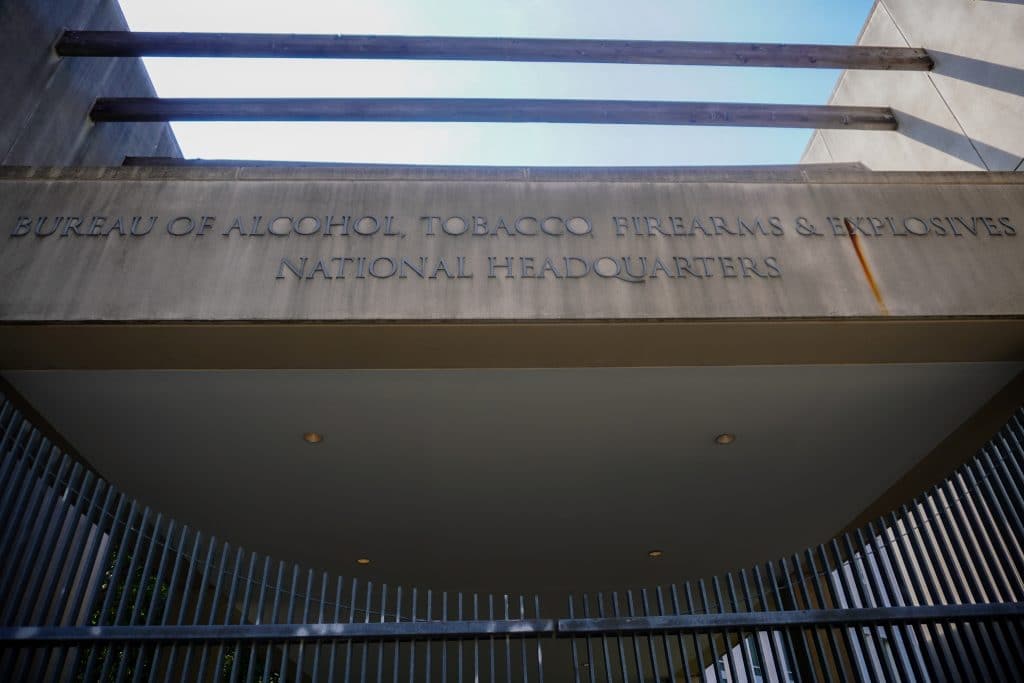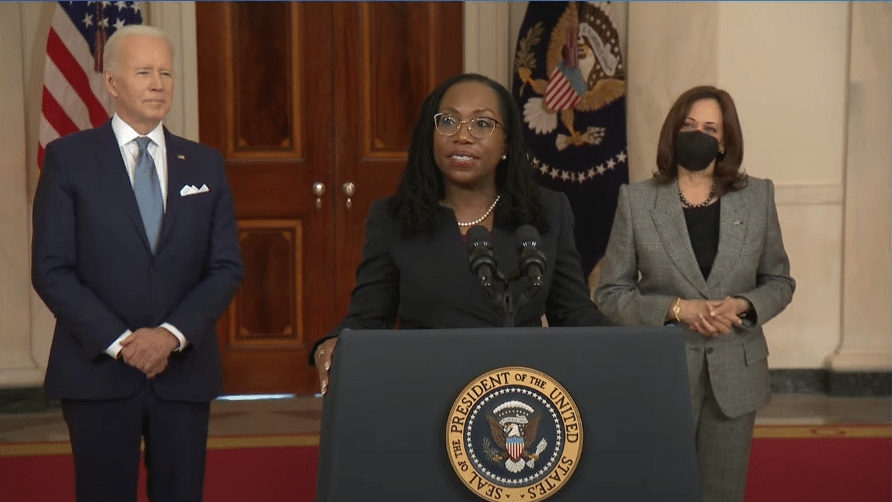This was the Ketanji Brown Jackson week. The 51-year-old’s last step on her path to a lifetime appointment to the Supreme Court came this week as she answered questions before the Senate Judiciary Committee. Her confirmation hearing was not focused on the Second Amendment, but there were several exchanges on the topic.
I examine what she said, what she didn’t, and what it all means.
At the same time, and with less fanfare, the ATF intensified its crackdown on devices and practices operating on the fringes of established gun laws. They’ve begun stretching interpretations of the National Firearms Act and Gun Control Act to aggressively pursue things like homemade sound suppressors or force reset triggers. That’s all in spite of the fact gun-control advocates becoming increasingly, and loudly, disillusioned with Biden and the agency.
Contributing Writer Jake Fogleman dives deeper into the details of what ATF has been up to.
Plus, Erick Erickson joins the podcast to discuss the state of the gun-rights movement and the Georgia gubernatorial election.

Analysis: ATF Aggression Under Biden Intensifies While Gun-Control Groups Signal Disappointment [Member Exclusive]
By Jake Fogleman
In recent weeks, the Bureau of Alcohol, Tobacco, Firearms, and Explosives (ATF) has begun cracking down hard on grey areas in firearm commerce.
The agency is doing so without President Joe Biden’s preferred nominee David Chipman at the helm and in the face of increasing complaints from gun-control groups.
The latest example is an open letter sent Thursday to all federally-licensed firearms dealers (FFLs) revealing the ATF has determined many forced-reset triggers (FRTs)—drop-in replacement triggers that increase the speed a semi-automatic gun can be fired—are considered machine guns under federal law. That will subject the previously-unregulated trigger devices to heavy regulation under the National Firearms Act (NFA).
“ATF’s examination found that some FRT devices allow a firearm to automatically expel more than one shot with a single, continuous pull of the trigger,” the letter reads. “For this reason, ATF has concluded that FRTs that function in this way are a combination of parts designed and intended for use in converting a weapon into a machinegun, and hence, ATF has classified these devices as a ‘machinegun’ as defined by the [National Firearms Act] and [Gun Control Act].”
Illegal possession of a machine gun carries a penalty of up to 10 years in federal prison. And it appears the agency is ready and willing to enforce those provisions.
“Based on ATF’s determination that the FRTs that function as described above are ‘machineguns’ under the NFA and GCA, ATF intends to take appropriate remedial action with respect to sellers and possessors of these devices,” the letter reads.
The letter explains those who have already acquired the devices legally should contact ATF to work out a way to relinquish them. For those that do not, the ATF may be paying them a visit in the future.
The veiled threat of future raids by federal agents over a niche firearms accessory calls into question recent attacks from gun-control organizations and The New York Times that the agency is too friendly to the industry. Major gun control groups Brady and Giffords have criticized the ATF’s work with the National Shooting Sports Foundation, the firearms industry’s trade group, and asked President Biden to direct the agency to sever ties with the group.
Similarly, a Times article from earlier this month describes acting ATF director Marvin Richardson as “an industry-friendly subordinate pumping the brakes” on federal gun control efforts. It also featured harsh criticism from John Feinblatt, President of Everytown for Gun Safety, calling for a “top-to-bottom overhaul” of the ATF.
“That starts with the administration making sure the agency has the resources and leadership it needs to regulate an industry that has consistently prioritized profits over public safety,” Feinblatt told the New York Times.
But if the agency lacks the resources and leadership necessary to regulate the gun industry, you wouldn’t know it based on its actions over the last several months.
Aside from Thursday’s open letter on FRTs, the ATF has also cracked down on home-built suppressors. On February 28, the agency denied 850 form 1 applications—the form that applicants who are not licensed to manufacture National Firearms Act (“NFA”) regulated items must use to create an NFA item legally. The applications were denied due to a change in interpretation by the agency of the definition of when parts constitute a silencer under law.
The agency has also, at least according to the NRA’s Institute for Legislative Action, started enforcing a new zero-tolerance policy this year on licensed gun dealers at the request of the Biden Administration. Under this new practice, FFLs can have their license revoked after a single violation of bookkeeping requirements or other regulations.
On top of the forthcoming rules to reclassify commonly owned pistol braces as NFA items and redefine “firearms” under federal law, these latest actions reveal a federal agency very much willing to regulate the firearms industry and gun owners more broadly. And they’re doing it all after Chipman’s nomination failed, despite critiques from gun-control advocates who said he was necessary for enforcement.
Podcast: Erick Erickson on how Guns Might Decide the Georgia Governor’s Race
By Stephen Gutowski
Nationally-syndicated radio host and author Erick Erickson joins the show this week to talk about the Georgia election, NRA, and Ketanji Brown Jackson.
Erickson, who lives in Georgia, has closely followed the gubernatorial election. The Republican primary has been particularly heated this year with former-president Donald Trump enticing former-senator David Purdue to run against incumbent Brian Kemp as a form of payback over rebuffed attempts to flip the 2020 election results. With Kemp facing stiff opposition he’s turned back to a policy he first ran on in 2018: permitless gun-carry.
Whether Kemp can get the bill over the finish line before the election comes will have a big impact on the race, according to Erickson. He also weighs in on the claim by Perdue and likely Democratic nominee Stacey Abrams that Kemp sat on the proposal until it was politically advantageous. He said even if those claims are true, it may not matter if Kemp ultimately delivers which he seems to be on the cusp of doing.
Erickson also talked about the idea the gun-rights movement has been so successful it’s started to lead to problems. He cites the corruption allegations weighing down the NRA as one example, but also pointed to some more questionable gun bills making it into law in deep-red states.
He said the gun-rights movement should refocus its efforts on fighting strict gun laws in deep-blue states rather than passing symbolic or even counter-productive laws in places they’ve already enacted a myriad of pro-gun policies.
Erickson also weighed in on why he isn’t convinced by President Biden’s Supreme Court nominee saying she believes in the Heller precedent. He said he doesn’t trust her not to overturn the landmark gun case given the chance.
Plus, Contributing Writer Jake Fogleman joins the show to talk about how armed Ukrainian civilians helped fend off a mechanized Russian assault on a key farm town.
And we speak to another Reload Member this week. Dennis Chapman, a lawyer and author living in Virginia, joins the show to talk about how he became interested in guns to the point of writing a book about the AR-15.
You can listen to the show on your favorite podcasting app or by clicking here.
You can also watch the episode on our YouTube channel.

Analysis: What We Learned About Ketanji Brown Jackson’s View on Guns [Member Exclusive]
By Stephen Gutowski
President Joe Biden’s Supreme Court nominee was grilled on her judicial beliefs in this week’s confirmation hearing. So, what did she have to say about gun litigation?
Judge Ketanji Brown Jackson had three significant exchanges on guns during her time before the Senate Judiciary Committee. They provided some insight into what she thinks about previous rulings by the Court. What she didn’t say was equally telling.
First, Senator Chuck Grassley (R., Iowa) asked if she personally believed in “the individual right to keep and bear arms is a fundamental right.” She responded not with her personal opinion but what she views the Supreme Court’s precedent to be in the landmark Heller v. DC decision.
“Senator, the Supreme Court has established that the individual right to keep and bear arms is a fundamental right,” Jackson said.
When asked to explain the Court’s precedent in her own words by Senator Marsha Blackburn (R., Tenn.), she added one further detail by saying, “under the Second Amendment there is an individual, fundamental right to keep and bear arms in the home.” She followed up on the Heller precedent in an exchange with Senator John Cornyn (R., Texas). Jackson told Cornyn she would respect the Heller precedent just as she would other precedents of the Court.
“Is it equivalent in terms of its precedence to Roe v. Wade, or would you evaluate it differently?” Cornyn followed up.
“I’m not aware of any ranking or grading of precedents,” Jackson said. “All precedents of the Supreme Court are entitled to respect on an equal basis.”
If you’re a gun-rights advocate, these answers are among the best you could hope for from a Democratic nominee in a modern confirmation hearing. Heller specifically answered whether the Second Amendment provided protections for individuals who want to own a handgun in their own homes for self-defense. Jackson delivers a fair shorthand description of current Second Amendment precedent and even says it should be respected on par with Roe v. Wade and other precedents.
However, that doesn’t mean Jackson is anything close to being a lock to side with expansive readings of Second Amendment protections. Her description of current precedent may be accurate, but it doesn’t guarantee she’ll decide to stand by it in future cases. She wouldn’t be the first Democratic nominee to sign on to an opinion at direct conflict with the findings in Heller despite describing them accurately during her confirmation hearing.
“I understand the individual right fully that the Supreme Court recognized in Heller,” Sonia Sotomayor said during her confirmation hearing in 2009.
But she joined dissenting justices in an opinion that concluded “the Framers did not write the Second Amendment in order to protect a private right of armed self-defense” during 2010’s McDonald v. Chicago.
And, as has become standard for modern nominees, Jackson refused to provide her personal view on Second Amendment protections in any real detail. Senator Blackburn asked her why it’s “constitutionally permissible” for gun rights to be subject to a local official’s “discretionary issuance of a license.” Jackson sidestepped the question by noting the Court was litigating it in NYSRPA v. Bruen.
“The Supreme Court is looking at that very issue in a case before it right now,” Jackson said. “And, as a nominee for the Supreme Court, it’s important that I not speak to it because the Court is deciding this question. It has a pending case, and I believe arguments have even occurred related to it.”
Blackburn then asked whether other rights should be limited by the subjective judgment of “government bureaucrats.”
“The Second Amendment, that right to keep and bear arms, is enumerated in the text of the Constitution,” Blackburn said. “So, the question would be ‘why should it have to have an extra burden?’”
“I understand the question. It’s one that the Supreme Court is looking at,” Jackson responded. “Consistent with past practice and the need to ensure I’m not speaking to issues that are live.”
Still, there’s at least some hope Jackson could buck liberal orthodoxy on gun laws given her answers as well as her background as a public defender and time working with libertarian think tanks on a Supreme Court brief. It may be easy to discount her comments during the hearing as boilerplate recitations of current precedent she won’t be entirely bound by once actually on the Court. However, nothing she said during the hearing gave new reason to believe she’ll be reflexively favorable towards gun restrictions.
That’s probably the best gun-rights advocates can hope for from somebody nominated by somebody with a record of pursuing strict new gun regulations like President Biden. It may even be a reason for pause from gun-control advocates. Though, it’s likely not enough to sway either side’s opinion of her nomination.
That’s it for now.
I’ll talk to you all again soon.
Thanks,
Stephen Gutowski
Founder
The Reload






